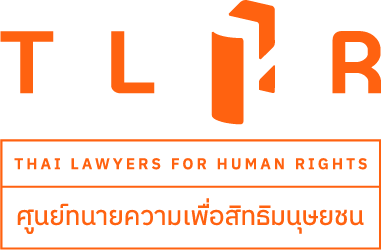Thai Lawyers for Human Rights
Thai Lawyers for Human Rights was established on 24 May 2014, two days following the coup in 2014, by a group of human rights lawyers and social activists. Initially as an ad-hoc organization, TLHR aimed to provide legal and litigation assistance to individuals who had been summoned, arrested, and detained by the military as a result of the 2014 coup. Following the election in 2019, we are committed to cultivating a healthy democracy in Thailand by:
CONNECT: We connect with people whose civil and political rights have been violated by offering free legal support to them.
TRANSFORM: We document the stories of what we found and key changes in Thai politics and society.
ADVOCATE: We meet with governments, the United Nations, diplomats, embassies, and like-minded Human Rights Defenders.
EDUCATE: We transform our documents and research into user-friendly materials/information to educate the public on civil rights and on how to act when facing legal encounters and violations.
VOICE: We voice Thailand’s human rights climate at both national and international levels.
VISION
To consolidate the Rule of Law
VALUES AND BELIEFS
- Human Rights at the Heart of What We Do
- Communication
- Problem Solving
- Confidentiality & Data Integrity
- Teamwork
- Accountability
TLHR operates with 2 major models;
- Litigation assistance: TLHR’s litigation team provides pro-bono legal and litigation assistance to individuals affected by law enforcements which violate basic civil and political rights. Moreover, if possible, the team will also file strategic cases in order to expand the boundary of exercising rights, to investigate authorities’ use of power, and to hold accountability of state personnel for their actions.
- Documentation and data collection: TLHR’s documentation team regularly documents and monitors human rights violations after the 2014 coup nationwide. Besides, the team disseminates the collected information related to human rights violation to raise public awareness in forms of news updates, articles, reports, legal opinions, or public statements. Also, it maintains online database of human rights violation in effect of the 2014 coup onwards.
Offenses that TLHR has received and handled in the past eight years include the royal defamation (lèse-majesté), sedition, violation of the NCPO orders and announcements, violation of the Computer Crime Act, violation of the Public Assembly Act, criminal defamation, and etc.
For enquiries, please call 092-2713172 and 096-7893173 at 24hrs
Facebook: https://www.facebook.com/tlhr2014
Twitter: https://twitter.com/TLHR2014
e-mail : [email protected]
Address : 66/4 Lat Phrao 16, Chom Phon, Chatuchak, Bangkok 10900
Eligibility criteria for TLHR legal aids
Four types of passive cases that fall under the TLHR’s main responsibility to provide legal aids:
1. Cases arising from a person’s act of exercising political and civil rights and freedoms or commenting/criticizing state agencies/officials’ use of power with an objective or a political motivation to promote democracy and rule of law.
2. Cases relating to an illegal act against a person who exercises his/her political and civil rights and freedoms with an objective or a political motivation to promote democracy and rule of law, such as an arbitrary arrest, an enforced disappearance, a physical abuse, and an extrajudicial killing.
3. Cases concerning the prosecution of, violation of, and harassment against a person as a result of 1. And 2.
4. Cases not eligible for TLHR legal aids according to 1., 2., and 3., but the meeting of the legal department or of TLHR deems them appropriate to receive such aids as they benefit the protection of people’s rights and liberties and TLHR has adequate resources in terms of human, time, and budget to do so.
Strategic cases, which are TLHR’s secondary mission to provide legal aids, consist of four components:
1. Cases in which a person uses a judicial channel or a legal/constitutional complaint mechanism with a goal to expand the scope of people’s constitutional rights and freedoms or verify the legality of state agencies/officials’ act restricting people’s rights and freedoms.
2. Cases that lead to a progressive change in the legal and social norms and that are in line with the democratic rule and the rule of law.
3. TLHR has adequate resources in terms of human, time, and budget to provide legal aids without affecting its capacity to do so to the passive cases considered TLHR’s primary responsibility.
4. The meeting of the legal department or TLHR deems it appropriate to file the case or provide a legal aid for it.
